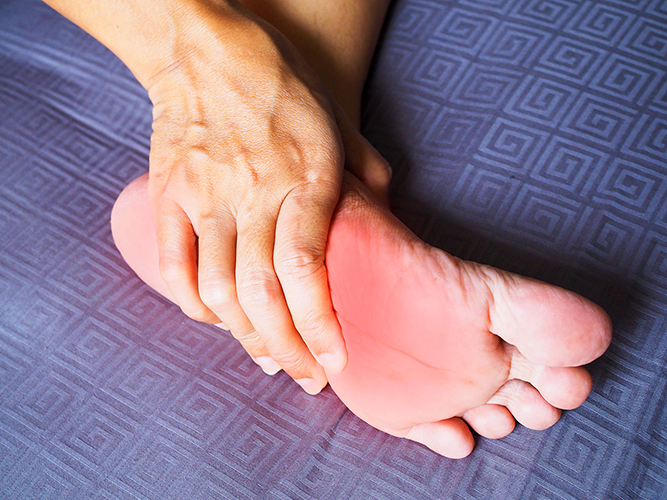
Neuropathy

What Is Neuropathy?
Neuropathy refers to damage or dysfunction of the peripheral nerves, which connect the brain and spinal cord to the rest of the body. This condition can affect sensory, motor, or autonomic nerves, leading to a variety of symptoms such as pain, numbness, or weakness. Neuropathy is a common condition and may result from underlying medical issues, injuries, or other factors.
What Causes Neuropathy?
Neuropathy can result from a wide range of causes, including:
- Diabetes:
- Diabetic neuropathy is the most common cause, resulting from prolonged high blood sugar levels that damage nerves.
- Injuries:
- Nerve compression from fractures, repetitive strain, or surgical trauma.
- Infections:
- Viral or bacterial infections such as shingles, Lyme disease, or HIV.
- Nutritional Deficiencies:
- Deficiencies in B vitamins (B1, B6, B12) or vitamin E.
- Toxins:
- Exposure to heavy metals, alcohol abuse, or certain chemotherapy drugs.
- Autoimmune Conditions:
- Rheumatoid arthritis, lupus, or Guillain-Barré syndrome.
- Other Medical Conditions:
- Kidney disease, liver disease, or hypothyroidism.
- Cancerous tumors pressing on nerves or paraneoplastic syndromes.
- Idiopathic Causes:
- In some cases, the cause of neuropathy remains unknown.
What Are the Symptoms of Neuropathy?
The symptoms of neuropathy depend on the type of nerves affected:
- Sensory Nerve Symptoms:
- Numbness, tingling, or burning sensations.
- Sharp, shooting, or stabbing pain.
- Sensitivity to touch or temperature changes.
- Motor Nerve Symptoms:
- Muscle weakness or cramping.
- Difficulty walking or performing fine motor tasks.
- Muscle atrophy in severe cases.
- Autonomic Nerve Symptoms:
- Dizziness or fainting due to blood pressure changes.
- Sweating abnormalities.
- Digestive issues, bladder problems, or sexual dysfunction.
If symptoms persist, worsen, or affect daily activities, seek medical evaluation.
How Is Neuropathy Diagnosed?
Diagnosing neuropathy involves a comprehensive evaluation, including:
- Medical history: Your healthcare provider will ask about your symptoms, lifestyle, and any underlying medical conditions.
- Physical and neurological examination: They’ll assess muscle strength, reflexes, and sensation.
- Blood tests: To detect diabetes, nutritional deficiencies, or autoimmune markers.
- Electrodiagnostic tests:
- Nerve conduction studies (NCS) to measure how fast electrical signals travel through the nerves.
- Electromyography (EMG) to evaluate muscle and nerve function.
- Imaging tests:
- MRIs or CT scans to detect structural causes, such as tumors or herniated discs.
- Nerve biopsy: In rare cases, a small sample of nerve tissue may be examined.
What Are the Treatment Options for Neuropathy?
Treatment focuses on addressing the underlying cause and relieving symptoms. Common approaches include:
- Medications:
- Pain relievers: Over-the-counter NSAIDs or prescription medications for severe pain.
- Anticonvulsants: Gabapentin or pregabalin to reduce nerve pain.
- Antidepressants: Amitriptyline or duloxetine to manage chronic pain.
- Topical treatments: Qutenza®, lidocaine patches or capsaicin cream for localized pain.
- Lifestyle Modifications:
- Diabetes management: Maintaining blood sugar levels to prevent further nerve damage.
- Healthy diet: Ensuring adequate intake of vitamins and nutrients.
- Physical Therapy:
- Exercises to improve strength, balance, and mobility.
- Techniques to relieve pressure on affected nerves.
- Assistive Devices:
- Orthotics, braces, or walking aids to support mobility and reduce discomfort.
- Alternative Therapies:
- Acupuncture, biofeedback, or transcutaneous electrical nerve stimulation (TENS) for pain relief.
- Spinal Cord Stimulation: Spinal cord stimulators are now approved for the treatment of diabetic neuropathy.
- Surgical Options:
- In rare cases, surgery may be performed to relieve nerve compression.
- Management of Autonomic Symptoms:
- Medications or devices to regulate blood pressure, digestion, or bladder function.
When Should You See a Doctor for Neuropathy?
Seek medical attention if:
- Symptoms persist or worsen over time.
- Pain, numbness, or weakness interferes with daily activities.
- There is a sudden onset of symptoms or rapid progression.
- You experience signs of autonomic dysfunction, such as fainting or digestive issues.
Take the First Step Toward Relief
Neuropathy can affect your quality of life, but effective treatments are available to manage symptoms and address the underlying cause. If you’re experiencing persistent discomfort or other concerning symptoms, consult a healthcare provider for a thorough evaluation and personalized care plan. Take control of your health and regain comfort today!
